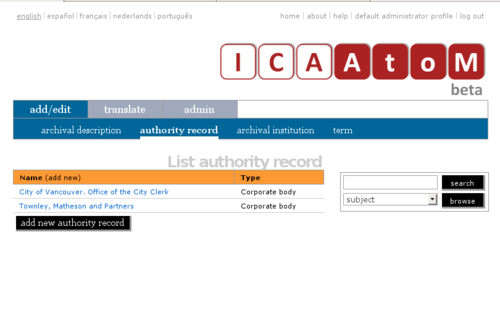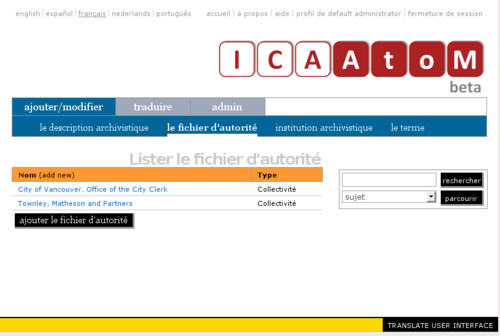Difference between revisions of "Multilingual design principles"
| Line 43: | Line 43: | ||
*All users with [[Translator|translator]] [[Access privilege|access privileges]] can add or edit translations of both [[User interface|user interface]] elements and [[Database content|database content]] in any of the [[Supported language|supported languages]]. In future releases, [[Translator|translator]] [[Access privilege|access privileges]] should be limited by both language and type of translation; for example, a translator may be restricted to translating only [[Database content|database content]] into only one language. | *All users with [[Translator|translator]] [[Access privilege|access privileges]] can add or edit translations of both [[User interface|user interface]] elements and [[Database content|database content]] in any of the [[Supported language|supported languages]]. In future releases, [[Translator|translator]] [[Access privilege|access privileges]] should be limited by both language and type of translation; for example, a translator may be restricted to translating only [[Database content|database content]] into only one language. | ||
| − | *There is currently no easy way to "see at a glance" what has or has not yet been translated. The current release of ICA-AtoM includes a | + | *There is currently no easy way to "see at a glance" what has or has not yet been translated. The current release of ICA-AtoM includes a ''translate > new content'' tab on the [[Main menu bar|main menu bar]]; in a future release it will list descriptions not yet translated into the user's current language. |
*There is currently no way for system [[Administrator|administrators]] to add new languages to ICA-AtoM via normal web-browser interaction. New languages can only be added by programmers working directly with the code. In future releases, [[Administrator|administrators]] will be able to add new languages to those supported by their application and to make their translations of the [[User interface|user interface]] available to the wider community of ICA-AtoM users. | *There is currently no way for system [[Administrator|administrators]] to add new languages to ICA-AtoM via normal web-browser interaction. New languages can only be added by programmers working directly with the code. In future releases, [[Administrator|administrators]] will be able to add new languages to those supported by their application and to make their translations of the [[User interface|user interface]] available to the wider community of ICA-AtoM users. | ||
Revision as of 17:30, 22 July 2008
Please note that ICA-AtoM is no longer actively supported by Artefactual Systems.
Visit https://www.accesstomemory.org for information about AtoM, the currently supported version.
Design principles
Main Page > (UM) User manual > UM-5 Translate content / interface > UM-5.1 Design principles
ICA-AtoM is a multi-lingual application and incorporates the following design principles:
- Both the user interface and the database content should be capable of existing in multiple languages.
- Users should be able to switch the user interface to their preferred language.
- When switching the interface to a preferred language, database content should also switch, if a translation is available; if not, the content remains in the default source language.
- Users with translator access privileges should be able to contribute translations of interface elements and descriptions from the default source language to any of the supported languages.
- Administrators should be able to remove languages that are not needed in their application; they should be able to easily add back supported languages that were removed.
- Over time, it should be easy to add new languages to the supported languages.
The current version of ICA-AtoM (v1.0 beta) supports the following languages:
- Dutch
- English
- French
- Portuguese
- Spanish
When installing ICA-AtoM, the administrator specifies the default source language. Any user can switch the language view to display the user interface and database content in any of the other supported languages.
Note that ICA-AtoM makes no attempt to automatically generate "translations" from one language to another. It is up to individual translators to do the translations. ICA-AtoM does not "do" translation, rather it supports the activities of translators by providing a structure in which users can contribute translations of descriptions and link these back to the originals.
Known issues (v1.0 beta)
- It is assumed that the original description is always written in the default source language of the application and then subsequently translated into other languages. In fact, in a multi-linguistic system, the originals may be in any number of languages. The only way currently to distinguish the original from the translation is by including a note in the notes area of the archival description or in the control area of the authority record or archival institution. See UM-3.1.9 Archival description: Notes area or UM-3.4 Control area.
- All users with translator access privileges can add or edit translations of both user interface elements and database content in any of the supported languages. In future releases, translator access privileges should be limited by both language and type of translation; for example, a translator may be restricted to translating only database content into only one language.
- There is currently no easy way to "see at a glance" what has or has not yet been translated. The current release of ICA-AtoM includes a translate > new content tab on the main menu bar; in a future release it will list descriptions not yet translated into the user's current language.
- There is currently no way for system administrators to add new languages to ICA-AtoM via normal web-browser interaction. New languages can only be added by programmers working directly with the code. In future releases, administrators will be able to add new languages to those supported by their application and to make their translations of the user interface available to the wider community of ICA-AtoM users.

